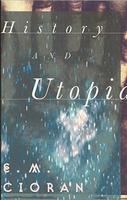History and Utopia
History and Utopia (French: Histoire et utopie) is a 1960 philosophical book by the Romanian philosopher Emil Cioran (1911-1995), which analyzes the ascendancy of the Soviet Union, the psychology of tyranny, and the historical concept of Utopia. The book also deals with several negative themes which permeate Cioran's work, including dissatisfaction with the world, the importance of negative emotions, and philosophical pessimism. Born in Romania, Cioran wrote several early philosophical works in his native Romanian language. As a young man Cioran sympathized with the Iron Guard, a Romanian fascist movement. This prompted him to write The Transfiguration of Romania (1936-7), a work which argued for the installation of a totalitarian government in Romania. In 1937 Cioran relocated to Paris, where he would remain for the rest of his life. This move marked a clear break in Cioran's life, dividing his work into an early Romanian period and a mature French period. Following the conclusion of World War II, Cioran disowned The Transfiguration of Romania and began to publish works in French, the language in which he wrote for the remainder of his life. History and Utopia was published in 1960, toward the middle of Cioran's French period. History and Utopia is a collection of essays, one of which ("Letter to a Faraway Friend") was addressed to the philosopher Constantin Noica. Noica, a friend of Cioran's, remained in Romania and had also been sympathetic to the Iron Guard during the war. The appearance of the essay led to Noica's conviction for charges as a political prisoner, within the post-war, communist Romania. Source: Wikipedia (en)
Editions
4- date of publication: 1996-03-01ISBN-13: 978-0-7043-0141-2
- date of publication: 2015ISBN-13: 978-1-62872-425-7
- date of publication: 1998ISBN-13: 978-0-226-10676-2
In your inventory
In your friends' and groups' inventories
Nearby
Elsewhere
Work - wd:Q3137972


